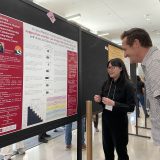To Science Students Everywhere: Don’t let midterms get you down Remember, all the fun and important stuff is challenging
March 30, 2017
Scientific American recently published a very insightful article, which may be timely for students as they take their midterm exams: “One Reason Young People Don’t Go Into Science? We Don’t Fail Well”. If you haven’t read it yet, I recommend it. This also seemed like a good time to send a message out all students: If you’re feeling stressed about your grade after a midterm, don’t let that completely discourage you.
A very good analogy for training in science is training for sports, or training for arts (music, dance, etc.). In all these cases what actually matters is the training, the hours spent on repetition and revision to get good at that thing. It’s like any other skill that you have to build over time. To do well, you just try over and over until you get it right. When you fall, you get up again and try again. Ask any good football player or ballet dancer how many times they have failed before getting things right, and you will hear much the same story. Science should be taken in this same spirit. Physics, my home discipline, is not unique or even anomalous in this respect, but it’s often the first challenging science course that students encounter.
I know that a common trap is that if you are a clever person, or have found previous courses “easy” or “straightforward”, it can lull you into a false sense of complacency. However, no matter how clever you have been in the past, you will always reach a point where you can no longer easily get by, and you must put in serious effort to progress. You must learn to actually study. All successful scientists hit this barrier and push through it – the barrier is in different places for every person. It may be that you have hit that barrier already, and it may be that you have not hit it yet, but be assured that no person can do interesting scientific work without overcoming this barrier. All the fun and important stuff is challenging.
Most importantly, you should never compare yourself to others in a course and think “everyone else seems to be getting it faster” because every person finds different things difficult based on background, etc. Moreover, other people are probably thinking the same thing about you. (This extremely common feeling is known as imposter syndrome.) You should compare yourself only to yourself, and work to just improve from where you are now, as with any discipline. The key is diligence, consistency, and, above all, patience.
I have every confidence that if you work hard and want to succeed, you will.
Justin Dressel, Ph.D., is assistant professor of physics in the Schmid College of Science and Technology at Chapman University. He is also our resident “gram expert”.

